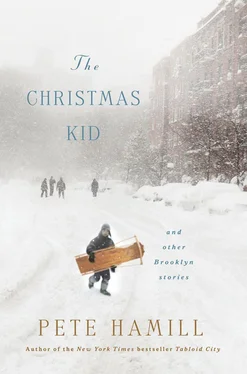The note was not signed. But Hirsch was suddenly flooded with a feeling of redemption and hope. His car was back! One of Them had explained himself. One of Them even had offered reparations. Hirsch rushed up the stairs to tell his wife, and she laughed, and told him it just proved that New York was not as crazy as Hirsch thought it was, and said that they really should celebrate. The tickets were for that night. They should use them.
“Why not, Hirsch?” Margaret asked. “We can drive the car to Manhattan, so it shouldn’t get stolen again.”
Hirsch immediately agreed. He made a reservation at Frankie & Johnnie’s for after the theater, took a hot bath, dressed in his best suit. He thought his wife looked beautiful. He wished the kids, grown up and moved away, could see her like this. And at 7:15 they went off to the theater. Margaret enjoyed the show more than Hirsch did; he simply didn’t identify with the problems of show-business people. But still, it was a Broadway show, a night in New York.
With an act of will, he ignored the crazies, the autograph nuts, the shopping-bag ladies, the junkies and knifers and walking wounded of Times Square. The lamb chops at the restaurant were delicious. They drove home in near silence, Hirsch saying that such nights were what made him love New York in the years when he and Margaret were young.
“Now, if you find a parking spot, “Margaret said, “it will be a perfect night.”
“Maybe our benefactor, the thief, will hold one for us,” Hirsch said, and they both laughed.
They cruised the streets of Brooklyn Heights for twenty minutes, and finally found a spot. They strolled home hand in hand, and Hirsch went up the stoop with his key out. He opened the door and right away knew that something was wrong. The framed lithograph of the Brooklyn Bridge was gone. He motioned for Margaret to wait, and stepped inside to the right, where the living room was. Everything was gone. Paintings, photographs, chairs, couch, lamps, tables. The kitchen, too, had been emptied. He went back to the staircase and looked upstairs into the darkness, but he didn’t move.
“They took everything,” he whispered, backing up, fear rising in a wide band across his back. “They’ve been here. They’ve got it all.”
And now he wanted to run. Margaret took his arm, her face ashen, as they stared into the violated, plundered house.
“There’s a leopard in the yard.” Hirsch said. “It’s in the tree.” His eyes were wide with horror. “It has yellow eyes.”
Then, in the quiet street, with a slight breeze combing the trees, and a half-moon crossing the city, Hirsch held onto the railing, threw back his head, and began to scream.
DURING THE LONG DECADE after his mother died, Bondanella lived in a furnished room in Park Slope. The room was cozy and warm, with a small refrigerator and an electric stove, a clothes closet and a large chair. The bed was a bit hard, but Bondanella didn’t mind; he was used to it now, as he had become accustomed to the bathroom in the hall. He had his sink, his TV set, the plastic hamper for his dirty clothes, and didn’t care too much about the small pleasures. He had eliminated passion from his life as if it were a bad habit, and was frequently puzzled when he observed the tumultuous fortunes of the people he saw on TV. They lived dangerous lives, and Bondanella lived in safety.
Part of his sense of safety came from his insistence on routine, the only souvenir of his three years in the United States Navy. Routine pleased him: it eliminated choice, it gave his life structure. And so each day he rose precisely at seven, did precisely ten minutes of exercise, spent precisely five minutes in the shower, and took precisely twelve minutes to dress. He walked six blocks to the Purity Diner, and always ordered scrambled eggs and bacon, rye toast, coffee, and orange juice. The subway sometimes gave him problems, because it refused to follow Bondanella’s own careful schedule. But most mornings he was at his desk in the brokerage house on Broad Street at precisely ten minutes to nine. He took precisely an hour for lunch, and left the office at exactly 5:15.
There were, of course, no women in his life. Somehow all that had passed him by, although Bondanella had no real regrets. He saw marriage as a huge invasion of privacy, a disruption of safety. So in the evenings, Bondanella arrived alone at precisely seven at Snooky’s Pub, ordered the hamburger platter, and was home in bed, watching TV, by nine o’clock. On Saturday nights, he was a cautious adventurer. He went to Chinatown once a month; he tried other neighborhood restaurants; he ventured to downtown movie houses. He was always alone.
Then, one Saturday morning, he saw the tomato.
He was bringing his shirts to the laundry when he saw it, lying with other tomatoes on a stand in front of the Korean fruit and vegetable store. The tomato stood out from the others because it was still brushed with green. An ordinary young tomato. But when Bondanella lifted it, he felt youth, warmth, firmness, and he knew he had to have it. The Korean gave him fifty-one cents change from a dollar and slipped the lone tomato into a bag, and Bondanella went out, heading to the laundry, and was astonished to find himself whistling some old tune, with jumbled words, something about an umbrella. A tune he hadn’t thought about in thirty years. He fought down a sudden urge to forget about the laundry and go directly home. But that urge was frightening; it was a clear threat against routine, and as he dropped off the shirts, Bondanella discovered that his hands were sweating.
“You’re a beautiful tomato,” he said out loud as he closed the door to his room behind him. But it took him a while to open the paper bag, to reach in and lift out the tomato, and then heft it in the palm of his hand. He took it over to the windowsill and placed it directly in the center. The sun was streaming in, emphasizing the highlights on the tomato’s glossy skin. Bondanella trembled.
That evening, he went to see Return of the Jedi, sitting alone in the orchestra, baffled by the abrupt shifts in the story, unable to make sense of the dialogue. He went to Lombardi’s on Spring Street after the movie, and casually ordered rigatoni. But when the plate came, and he saw the luxurious sauce, his mind filled with an image of the tomato, home in Brooklyn, alone on the windowsill. He poked at the pasta, but had trouble eating it; the waiter was upset, afraid that the food had displeased a customer.
“It’s not the food,” Bondanella explained. “It’s me. I, er, don’t feel too good.…”
He went home, wondering what his mother would say if she knew that he’d paid for food he hadn’t eaten. Poor Ma. She led a hard life. But as he reached the house in Park Slope and hurried up the stoop, he was feeling better. He whistled the same half-remembered tune about a fella with an umbrella. And then, safe in the furnished room, he approached the tomato. He couldn’t see the color clearly in the artificial light, but he thrilled to its firmness and youth. When he tried to sleep, he tossed about, filled with odd anxieties.…
On Sunday morning, the tomato seemed larger. And redder.
“You…you’re growing!” Bondanella said in an amazed voice. He swallowed hard, reached out, and lifted the tomato from its sunny perch. She’s growing up, he thought. She’s changing.… The room was very hot now, and Bondanella felt tiny beads of perspiration on the tomato’s skin. Do tomatoes sweat? Or is it me?
“You’re the most beautiful thing I ever saw,” he said. He filled a bowl with cold water and placed her in it, the water intensifying her pale greens and deeper reds. The bowl was kind of her room. Then he heard the landlady’s heavy footsteps in the hall, and a sudden sharp knock on the door. He opened the door about a foot and stared at her powdery face, the mole on her chin, her rheumy, colorless eyes.
Читать дальше












